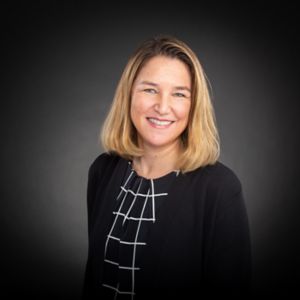St. Jude Family of Websites
Explore our cutting edge research, world-class patient care, career opportunities and more.
St. Jude Children's Research Hospital Home

- Fundraising
St. Jude Family of Websites
Explore our cutting edge research, world-class patient care, career opportunities and more.
St. Jude Children's Research Hospital Home

- Fundraising
Creating Supportive Spaces in Science with Heather Mefford, MD, PhD
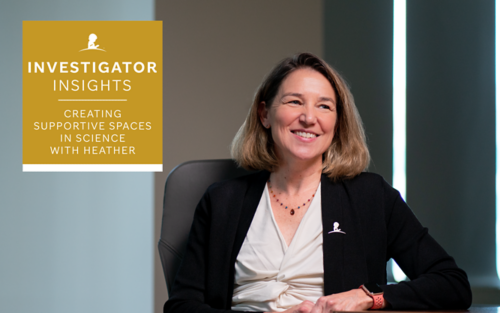
Heather Mefford, MD, PhD, creates supportive spaces where scientists can flourish at St. Jude.
Running a lab isn’t something we are trained to do in science. Our PhD programs do not prepare us for the ins and outs of operating a small-business venture in the research arena. Hiring, budgeting, managing, and mentoring are often not part of our grad school curriculum. But these are things that can shape a successful scientific culture.
Even after ten years of leading a lab, I’m still learning. Naturally, your management and mentorship styles evolve, just as you and your lab members do. To do good work, I’ve found it is important to enjoy what you do and be in an environment where you’re supported.
It can be very isolating if you don’t feel appreciated or included. So, I do my best to create supportive spaces for those I work with, especially women and underrepresented populations in science.
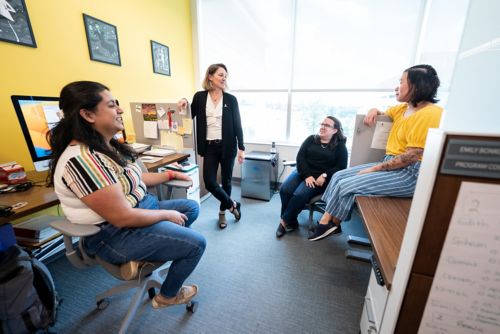
Heather Mefford, MD, PhD, catches up on the day with members of her lab.
In my own journey, I’ve been lucky enough to receive support that created environments where I and my scientific pursuits could flourish. And now, I hope to do the same for others.
Growing up, my mom advocated for academic opportunities that fostered my love of math and science. That wasn’t always easy to do in a small town in Iowa. In college, I studied chemical engineering, which is a male-dominated field. But I was able to connect with great girlfriends who were engineers; we just found each other.
When I decided to pursue the MD-PhD track at the University of Washington, I distinctly remember interviewing with three women principal investigators (PIs) and, I was fortunate enough to end up working with them when I moved to Seattle. They remain lifelong friends and mentors.
Once I had children, what I needed in terms of support changed. I had my first child in medical school and my second in residency. I worried about the reaction I would get when telling my program I was having a second baby during year two of residency (quite rare at the time), but I was met with excitement and a “what can we do to help” attitude by my residency leadership, most of whom were women. In turn, I am very supportive of trainees who want or have families, because I know there is no good or right time to have kids. But having a sound support system can make all the difference, and I work with them to provide the best support possible.
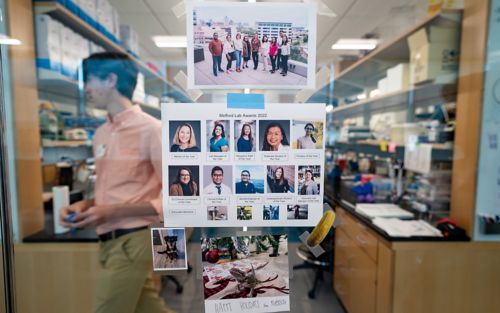
Awards from the Mefford lab on display outside the bench area.
Everybody talks about balance, and I’m not sure what that is, because there isn’t a perfect balance. It’s more of an ebb and flow. Your professional and personal needs intersect, and your environment influences your ability to prioritize in those ebbs and flows.
The kind of support you receive matters, and my goal is to offer a scientific environment that helps the individual succeed. In our lab, the structure is not very hierarchical - nobody is at the top. It operates on the basis that we’re a team all working toward a common goal of understanding pediatric epilepsy and using what we know about genetics to develop better therapies that can improve lives.
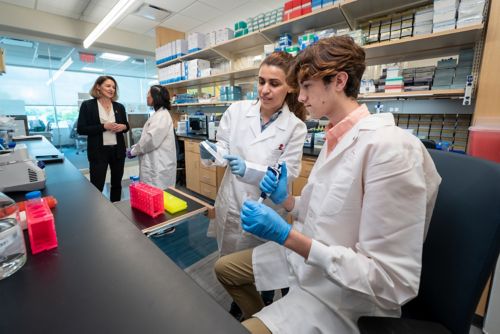
Heather Mefford, MD, PhD, talks with Christy LaFlamme while Esmat Fathi, PhD, guides Drew Murphy through an experiment.
Having that kind of structure and culture sets you up to include people in the conversation and allow them to contribute because they’re comfortable. For me, it’s important that comfort level also extends beyond the bench.
In 2020, I was still a PI at the University of Washington, and our lab was experiencing the same significant health and cultural reckonings as everyone else - a global pandemic, the Me Too movement and the murder of George Floyd, just to name a few. Everything was happening all at once.
It was a lot, and one of the lab members suggested we have social justice lab meetings. It was a time when we discussed not only what was happening, but also the science of diversity, equity, and inclusion. Where are the biases or gaps in engaging women and underrepresented people in science? Where do we lose them, and why?
We had open conversations about that kind of science, but it was also a safe space for people to show up and say, “This is what we’re going through right now, and yeah, this sucks.” As a leader, I try to acknowledge the presence of social issues, but I don’t live all these experiences. So, I try to create spaces for people to share their lived experiences and feelings.
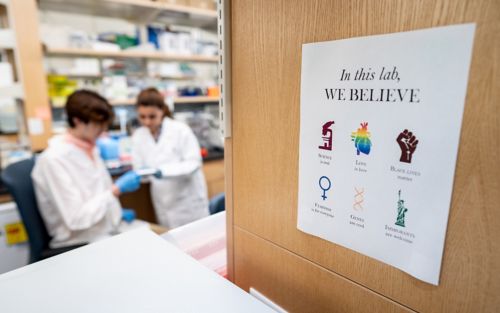
Core social values on display in the lab.
As a faculty member, I try to set an example. I’ve become less tolerant when I see or hear things that don’t provide adequate support or space for people to thrive, whether that be an all-male speaking panel, someone talking over another person in a meeting, or hiring practices that could be more intentional, expansive, and inclusive.
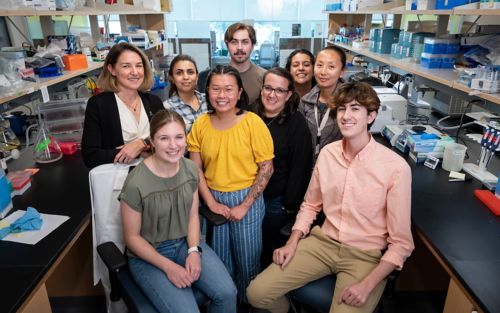
Members of the Mefford lab.
When we show up to the bench, we are part of a team. We all have a role to play both in progressing the science and making it more inclusive and supportive. As much as I’ve learned how to guide and support the people I work with, I’ve learned about myself too. It’s an ever-evolving journey - one full of growth and discovery - that I’m honored to be part of.
Learn more about Heather
- Learn about Heather’s research
- Discover her lab’s approach to targeting epilepsy
- Explore Heather’s role in the Center for Pediatric Neurological Disease Research
- Follow Heather on Twitter
